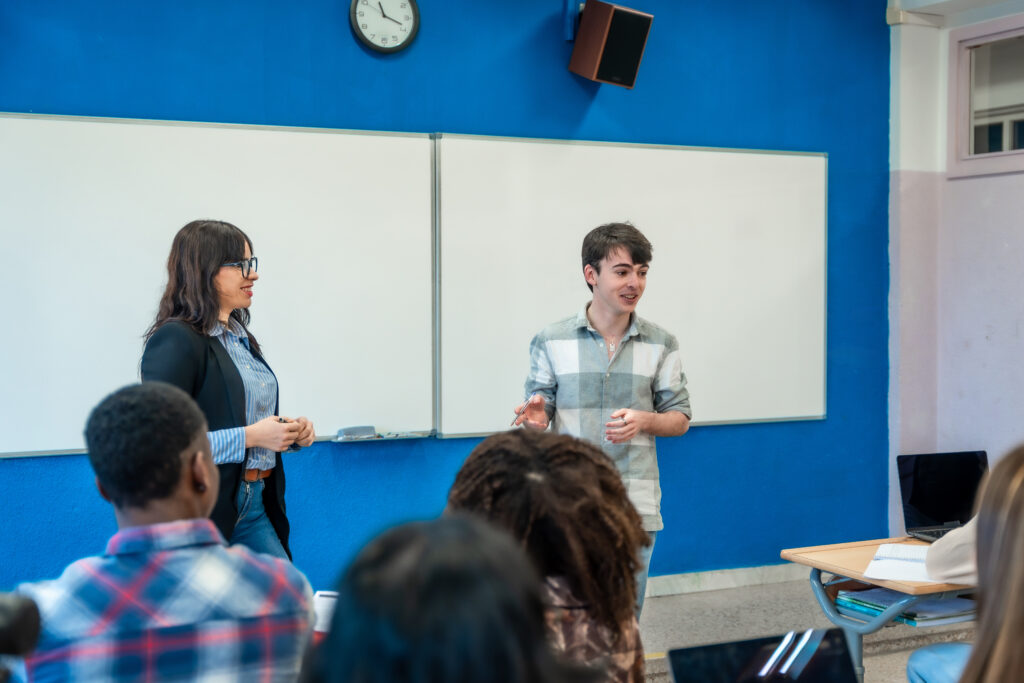Using your words to convince others that your point of view is the correct one is an ancient art, from the demagogues of ancient Rome to the debates of the philosophers in Athens words have had the power to cause great shifts in history and society. This continues to this day, with exceptional orators often finding success in politics or other communication centric fields. Using words in this way is a skill, one which must be learned, practiced, and mastered. High school students have the option to practice and compete in these ancient arts through a number of organizations. In this article, we’ll cover the basics of both speech and debate, explain how you can get involved, and discuss how it can help your college applications. Let’s get started!
Speech and Debate for High School Students
While the two are linked together, Speech and Debate are completely different activities. They are akin to different sports; there are some similarities between them, but the details differ, and those are what matter most. Both are competitive however, and both are most commonly associated with the National Speech and Debate Association; though it is hardly the only provider. We’ll now go through each in turn, to explore it thoroughly.
Speech
Speech is the art of making a verbal statement on a subject. This has many different varieties, but they are in general divided into two camps:
- Public Address Events: These rely on the student giving a speech that they have composed. This may be written well in advance or composed briefly for extemporaneous speaking. These speeches can try to persuade audiences, educate them, or argue for a specific belief.
- Interpretation Events: Here, students give a reading of a speech or other written work created by someone else. These are published material, and generally center on a theme of some kind.
These are both competitions, where many students give speeches in the same format and on the same topic, and are judged on their rhetoric and presentational skills. What you say and how you say it are both quite important; speech is a performance, and lacking in style or substance will hurt your score.
Tournaments are held regionally at high schools, with state, national, and international tournaments held by invitation depending on your performance in lower level events. There are several organizations which organize and put on speech tournaments, but most national competitions are hosted at and put on in partnership with colleges and universities.
High schools generally have established speech teams. These function somewhere between a sport and an academic club, and are sometimes but not always connected to the debate team.
Debate
Debate is directly competitive, with students each presenting on the same topic in direct opposition to each other, and being judged on how compelling their arguments are. Debate topics may be known well in advance, or given very shortly before the debate begins. Here are the most common styles of debate:
- Policy debate: This is a 2v2 debate, with a new vague topic announced yearly to be debated. The affirmative side must present a plan to implement what they propose; thus this debate format requires a lot of research.
- Lincoln-Douglas: This is a 1v1 debate with topics changing every two months. This usually requires debaters to discuss the merits of different schools of thought.
- Public forum: These are 2v2 debates with topics that change every month, generally related to current events. Debaters generally have to defend either the status quo or a change to the status quo.
- World Schools Debate: These are 3v3 debates with topics that change every round; these can be impromptu or prepared. This debate has an international championship.
- British Parliamentary: This is a 2v2v2v2 debate, with two teams on each side of a policy issue. Teams are ranked out of four, and are not allowed to collaborate. Each round is impromptu, with the topic announced shortly before the start of the round.
It is normal for students to compete in multiple different forms of debate, though this depends on your own debate team, and the tournaments you compete in. High schools generally have established debate teams, which can be attached to or separate from teams dedicated to speech. These teams often operate similarly to sports teams, with long practices and travel to events which may take significant time.
As with speech, debate is a performance, and the content of what you say has equal importance to how you say it. There are different tools of rhetoric and persuasion used when debating, which you master through practice.
Speech and Debate in College Applications
In many ways, the activity which speech and debate most resemble in college admissions is sports. Speech and debate had competitive societies in colleges long before they spread to high school, and top colleges often compete fiercely with each other in these fields.
As with sports, many colleges will recruit for these teams. While speech and debate coaches do have far less sway than athletic ones, getting recruited for speech and debate can greatly increase your chances of getting into a school.
Part of the reason for that, though, is that the only way to get recruited for speech and debate is to be nationally successful, which is quite impressive in its own right. Winning any national academic competition is a capstone achievement to show off to admissions officers, and speech and debate tournaments are some of the oldest and most respected academic competitions available. Only a few students can win each year, but they often have a much easier time getting into top colleges.
On top of this, both of these activities tend to be fairly time intensive, and require significant commitment from you in order to compete. Colleges like to see long hours of continual commitment to a single activity, as this demonstrates your passion and drive. Read more about how colleges judge extracurriculars in our article on the subject here.
Should You Participate in Speech or Debate?
While participating in speech and debate can be a lot of fun, it isn’t the right activity for all students. As with all high school extracurricular options, there are both pros and cons to consider. The most important of this, as with so many other activities, is the time investment. If you do speech or debate seriously, it will require a major investment of your time. You can still participate in other activities, but it will be the largest consumer of your free time, and limit your ability to deeply involve yourself elsewhere.
This is true of many potential activities, but means you should be sure you actually enjoy the activity before you commit to it. If it’s something you enjoy a bit, but don’t want to spend all of your time doing, then aim for a lower commitment level, and understand that it won’t have much impact on your admissions chances.
If you are interested in political science or public policy, then speech and debate are useful activities to be involved with, along with other classic examples such as Model UN. While it may not directly prepare you for politics, understanding how to craft a compelling argument serves political commentators and politicians quite well.
We finally want to note that speech and debate tends to attract a certain variety of students, those who enjoy arguing for its own sake, and rhetorical tricks, and the fun which can be found in detail oriented pedantry. There is nothing wrong with this, but not everyone will thrive in such an environment, and may not enjoy spending time there.
If you are interested, we do recommend trying speech or debate; it may not be for you, but dipping your toes into the water to see if it suits you is harmless. You shouldn’t join specifically to get recruited by colleges; this is as difficult as athletic recruiting, but it can be a fun way to spend your time in high school.
Final Thoughts
There are many ways you can spend your time in high school, and many worthy activities which can aid you in college admissions and beyond. While speech and debate might not be the right choice for all students, they can be well worth your time for those who are interested in them and have an aptitude for rhetoric.
We hope that this article has given you a solid introduction to speech and debate, and shown you whether or not they are worth pursuing for you. Of course, there’s no single right way to build candidacy and prepare for college; each student is unique, and must find their own path. If you are looking for help along that path, or advice on how to play to your strengths, schedule a free consultation today. Our candidacy building service excels in helping students make the most of their time in high school, and we’re always happy to hear from you.








